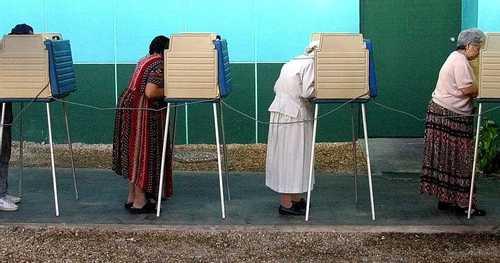Voting Rights: A Short History | Voting Rights | Carnegie Corporation of New York
Curated from: carnegie.org
Ideas, facts & insights covering these topics:
18 ideas
·1.15K reads
2
Explore the World's Best Ideas
Join today and uncover 100+ curated journeys from 50+ topics. Unlock access to our mobile app with extensive features.
Voting in the 1700s
For decades, only white property holders would have the right to vote in the United States. Moreover, some states even made sure that only Christian men had this vote.
21
215 reads
Voting in the 1800s
Even though during the Reconstruction period, after the Civil War, individuals were supposed to be allowed to vote no matter their race, in the following decades many Southern states, by means of poll taxes or literacy tests, would still limit the right to vote of the African American men.
19
71 reads
1920 and women's voting right
In 1920 women won the right to vote with the ratification of the 19th amendment to the American Constitution.
20
102 reads
Voting in the 1960s
In 1960 voting was still mainly limited to white property holders in the South of the United States. Therefore, starting with 1965 there were repeated protest marches in order to make the nation aware of this injustice towards black people, immigrants and poor individuals.
18
55 reads
Voting in 1964
For an entire century following the Civil War, voting was restricted due to poll taxes: people had to pay in order to be allowed to vote. However, in 1966 the Supreme Court ruled that poll taxes were unconstitutional.
15
58 reads
Voting in 1965
In 1965 the Congress passed the Voting Rights Act. This did not only remove policies and practices that had been previously used in order to limit voting, but it also suppressed voting rights based on race.
16
57 reads
Voting in 1971
The 26th amendment introduced a prohibition that made possible that any person 18 years of age and over would be able to vote.
15
51 reads
Voting in 1975
Congress introduced new provisions to the Voting Rights Act that would enable minority groups to vote, helping them with multilingual assistance at the polls.
15
58 reads
Voting in 1982
The Voting Rights Act was extended for another 25 years through a law passed by the Congress, while there were also being asked steps to be taken towards making voting more accessible to both elderly and people with disabilities.
15
58 reads
Voting in 1993
Congress passed the National Voter Registration Act, according to which citizens were, among other provisions, allowed to vote when they applied for their driving license.
15
45 reads
Voting in 2000
During the Bush-Gore Presidential race, many of the problems faced by the USA elections became public: faulty equipment, bad ballot design, inconsistent rules etc.
15
51 reads
Voting in 2002
In 2002 the Congress passed the Help America Vote Act, that would allow elections to go more smoothly. Therefore, outdated voting equipment was replaced, voter registration lists were created statewide and people with disabilities had the chance to start voting easier.
15
62 reads
Voting in 2010
In 2012 was created the State Infrastructure Fund, which had as purpose to invest in advancing voting rights and expanding voting among different communities that had long been underrepresented.
15
44 reads
Voting in 2013
2013 was an important year in terms of voting rules in the USA. For instance, the Supreme Court changed the Voting Rights Act: the preclearance requirement was therefore removed. As a direct consequence of this, many states went back on imposing restrictions on who could vote, basing their decisions mainly on racism and discrimination.
16
54 reads
Voting in 2014
While many states were going back to imposing their restrictions on who could vote, voting rights organizations were fighting in order to give everybody a fair chance to express their will. The Mexican American Legal Defense and Educational Fund, the collaborative of 12 such organizations, played a major role in decreasing injustice in the field.
15
39 reads
Voting in 2016
Trump's election in 2016 was largely debated, as many votes had been made illegally. However, government has not yet proven able to make the necessary investments in elections, which would normally lead to more trustworthy results.
15
51 reads
Voting in 2018
In 2018, there was still a lot of discrimination going on when it came to voting: election officials would close polling places, letting communities of color without the chance to vote or even cut voting hours, all in order to discriminate the black population. However, in November 2018, a record number of votes was recorded, with many women and candidates of color participating in the election process.
16
33 reads
Voting in 2019
2019 was all about preparing the upcoming elections from 2020. These are to be based on the Census and will most probably lead to an even bigger injustice towards the already underrepresented populations.
16
55 reads
IDEAS CURATED BY
Similar ideas
7 ideas
10 ideas
10 of the most bizarre elections in American history
edition.cnn.com
Read & Learn
20x Faster
without
deepstash
with
deepstash
with
deepstash
Personalized microlearning
—
100+ Learning Journeys
—
Access to 200,000+ ideas
—
Access to the mobile app
—
Unlimited idea saving
—
—
Unlimited history
—
—
Unlimited listening to ideas
—
—
Downloading & offline access
—
—
Supercharge your mind with one idea per day
Enter your email and spend 1 minute every day to learn something new.
I agree to receive email updates
